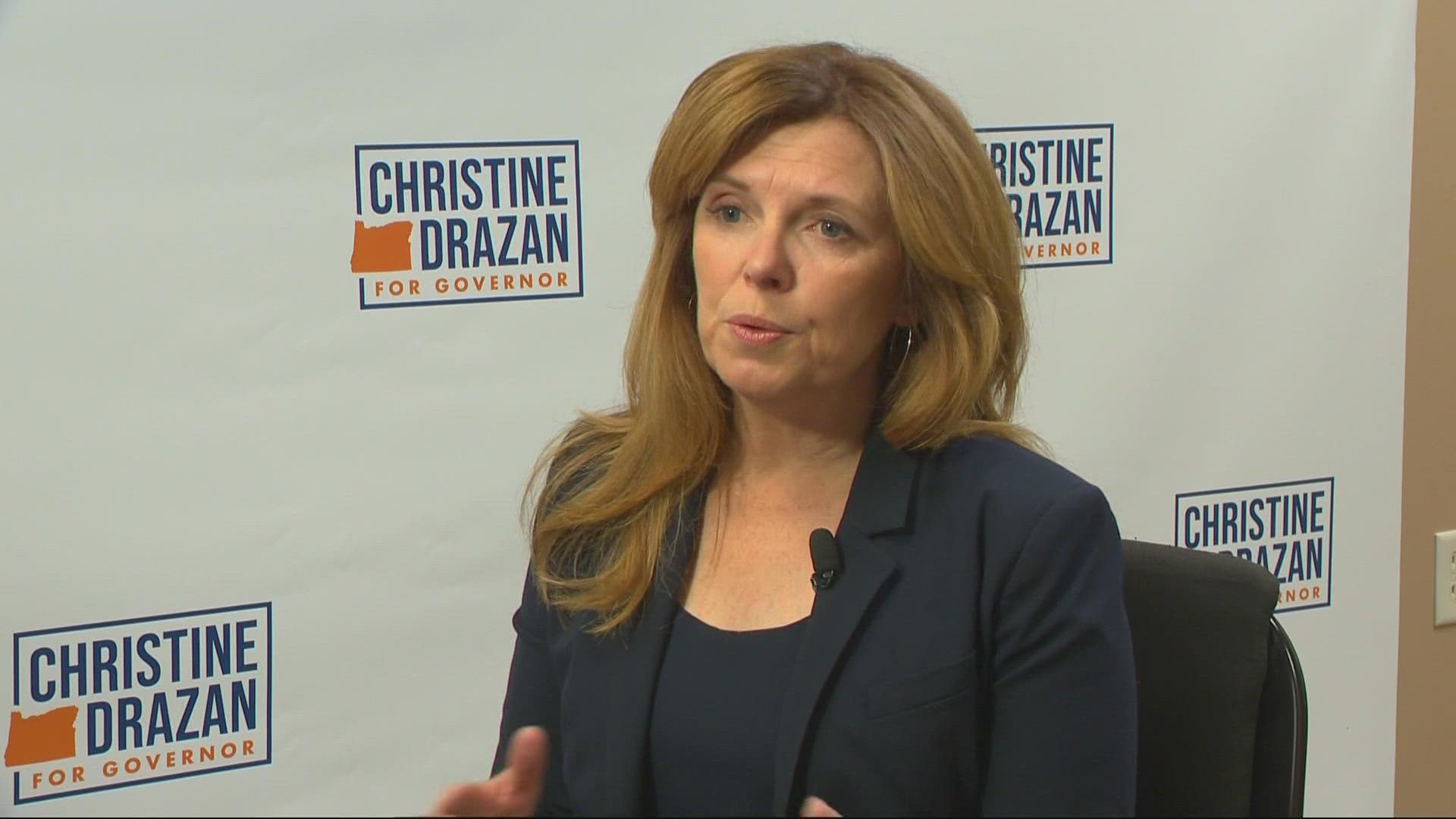OREGON, USA — It’s about five weeks until the November election and the race for governor is heating up. According to recent polls, Republican Christine Drazan is in the lead and Democrat Tina Kotek is not far behind, followed by Independent candidate Betsy Johnson.
KGW is sitting down with each of these candidates ahead of the election to hear their stance on the homeless and housing crisis, starting with Drazan, who would be Oregon's first Republican governor in nearly 40 years if elected.
KGW will speak with independent candidate Betsy Johnson Tuesday and Democratic candidate Tina Kotek next week.
RELATED: Candidates for Oregon governor respond to 'Uncommitted' investigation and civil commitment standards
Here is the interview between KGW reporter Blair Best and Christine Drazan, lightly edited for length and clarity. A couple of Drazan's answers have been summarized, with those sections noted in italics. The full interview can also be viewed at the bottom.
Drazan: We have a crisis in our streets that is driven by our homeless issues. Of course Oregonians are feeling it.
Drazan said she believes the solution to this crisis starts at the state level and, if elected, she will declare a homelessness state of emergency.
Drazan: Handing this down to municipalities — I don’t think this is the best approach for full responsibility. If you think about it, homeless populations by the nature of being unhoused, they really do move between jurisdictions.
Best: What tools will you use specifically that we aren’t using already?
Drazan: You know, the opportunity to provide a legal basis for communities moving forward with their response to homelessness I think is very, very important. A lot of communities, if you talk to local mayors, county commissioners, they feel like their hands are tied today…it will be support for shelter space, it will be additional investments and it will be support for workforce that will back up the mental and behavioral health needs that we have as a state.
Best: Where will that money come from?
Drazan: You will see in my first budget a prioritization of that with dollars that are otherwise being directed right now to programs that are not as essential and critical, so we’re talking general funds support.
Best: On your campaign website, you say you’re aiming to make homelessness rare and temporary while some of your competitors are aiming to get rid of it altogether. Why is it that homelessness won’t be going away under your leadership?
Drazan: Yeah, the approach to homelessness, I think, needs to be an approach that’s long term. There are no magic bullets to — in some cases — the human condition, and we have programming right now within the metro area that local jurisdictions have adopted that I’m really strongly supportive of, and that program right now is called Built for Zero, and the concept behind this is that they are really able to better understand who’s on their streets and better understand what services and supports they need to try and transition from being houseless to being fully stabilized and be able to contribute to their own lives in their best future again.
Best: How will you not only address this crisis but also the symptoms of this crisis like addiction, trash, crime…
Drazan: A lot of those challenges are in fact in the hands of local communities to ensure that their local police force is fully funded. I will support fully funding police at all levels of government.
Drazan said she will also work to repeal Measure 110, which decriminalized possession of certain hard drugs.
Drazan: Legalizing Measure 110 was a mistake for Oregonians from my perspective, now that we’ve seen it on the ground.
Best: There is a lack of addiction treatment facilities in Portland. What will you do to increase those facilities and those services?
Drazan: Right now, we have the ability to work alongside our non-profit partners to make sure they have the support they need to continue to expand services… But when it comes to addiction treatments in supports, we have access not just in Portland but across the entire state.
Best: What specifically will you do at the statewide level to increase these services?
Drazan: We have got to better understand what’s available right now, where our opportunities are to get people into treatment immediately and then make the decision of ok, what services are lacking, what else do we need to expand, where do we need to expand it?
Best: You also speak of building more affordable housing units, but that’s a very lengthy process and we need immediate action.
Drazan: So to be clear, on the affordable housing side of things there’s a huge difference between state-funded, state-mandated affordable housing units. You know, we’ve spent nearly two billion dollars all in on housing in the last year and a half in the state of Oregon, whether or not that is support for renters or landlords or whether or not that’s building tiny homes and increasing access to affordable homes. What I’m talking about when I talk about affordable housing, when I talk to builders, when I talk to people who are on the private sector side, they are saying "I can build houses, I can build apartments; I need local governments to work with me, I need to be able to move through the regulatory process in something as short as two years" … In my first 100 days of office, I’ve committed to reviewing rules and regulations across the board and revising, repealing, or rolling back the ones that are an impediment and a barrier.
Best: If homelessness is someone’s primary issue, primary concern going into this election, why should they vote for you?
Drazan: You know, I am the only candidate in this race that has not been part of the problem for the last ten, twenty years that got us here.
Watch the full Drazan interview:

